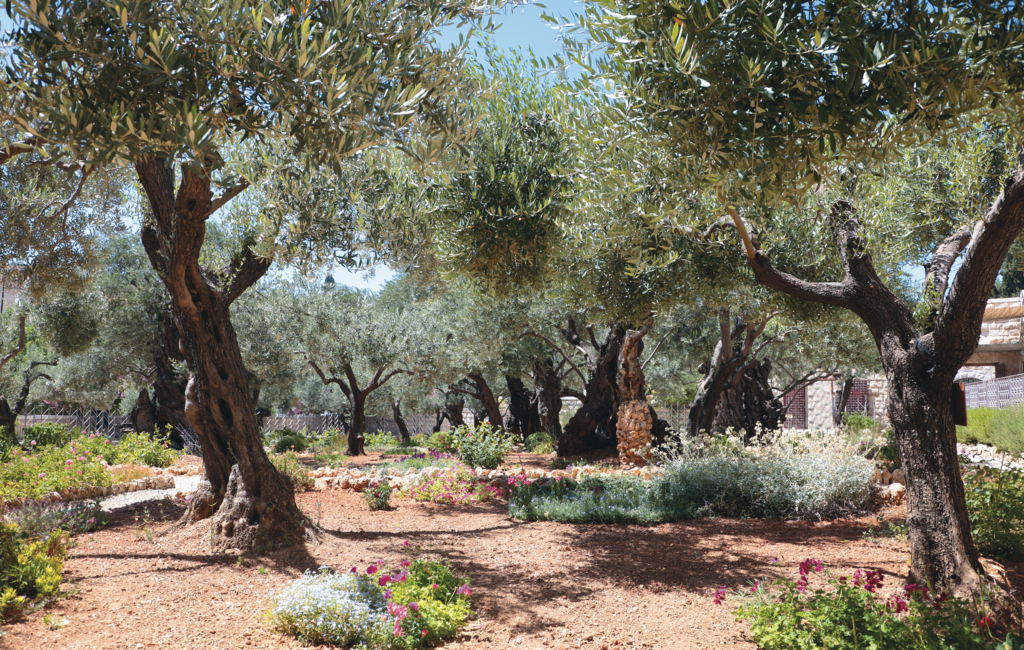After the Last Supper Jesus and His disciples make their way towards the Mount of Olives and the Garden of Gethsemane. During the journey Jesus teaches the disciples many things that can be found in John 15 and 16 including the High Priestly Prayer that is recorded in John 17.
The Journey
Since His triumphal entry into Jerusalem, Jesus and the disciples have spent their nights in Bethany, a village a few miles east of the Mount of Olives. We do not know for sure that Bethany was their destination that fateful night, but we do know that Judas was familiar with their lodgings and knew of the garden on the way as Jesus had stopped there in the preceding days to pray and teach (Matthew 24). Judas used his familiarity with Jesus’ footsteps to lead the temple authorities to intercept and arrest Him.
Jesus spoke of many important topics while he was walking with His disciples towards the Garden including: Bearing much fruit as branches of His vine to prove their discipleship (John 15:1-11); Loving one another (John 15:12-17); Recognizing the world would persecute them, but a Helper – the Spirit of Truth would come (John 15:18 – John 16:15); and His death and resurrection (John 16:16-33). It is reasonable to assume that at some point Jesus and the disciples stopped before they reached the Kidron Valley and entered the Garden of Gethsemane. At that point Jesus, “lifted His eyes to heaven” and prayed over them.
The High Priestly Prayer
Read John Chapter 17 in its entirety, slowly if you have to so that you can clearly identify each subject.
What is the significance of Jesus’ statement, “the hour has come?” How important is it that Jesus wasn’t haphazardly crucified by the Romans, but rather, “gave Himself up for us, an offering and a sacrifice to God as a fragrant aroma?” (Ephesians 5:2b) From whom does eternal life come? Why is Jesus able to grant eternal life? How do we receive it?
The Disciples
The Disciples are the subject of verses 6-19. Notice the love of the Good Shepherd towards those in His flock that are standing before Him. Jesus asks of the Father in verse 17 “Sanctify them in the truth, thy word is truth.” Sanctify means to be set apart. How important is truth to you? What does it mean to be “set apart in the truth?” Do you see God’s Word as truth? It what meaningful way can you see that you are being sanctified in the truth?
In verses 20-21 Jesus appears to look through time to those that, “believe in Me also through their word.” Who are the “those” that will believe? Who is Jesus referring to? What implications does this have for followers of Jesus Christ today? What does Jesus ask for these believers?
You In Me And I In You
The Godhead is extremely difficult to conceptualize, but oneness in the Godhead is not. John starts his Gospel with the glorious statement, “ In the beginning was the Word, and the Word was with God, and the Word was God. He was in the beginning with God. All things came into being through Him, and apart from Him nothing came into being that has come into being.” In John 17:21-26 the theme of oneness that exists in the Godhead is extended to those who believe. Why does God want to be one with man? What is a practical thing you do to experience oneness with the Godhead?
Love
Jesus end His High Priestly Prayer with the request that, “the love with which You loved Me may be in them, and I in them.” Does the Father love you like He loves Jesus? How does God’s love within you show itself to you? How does His love in you show itself to others?


